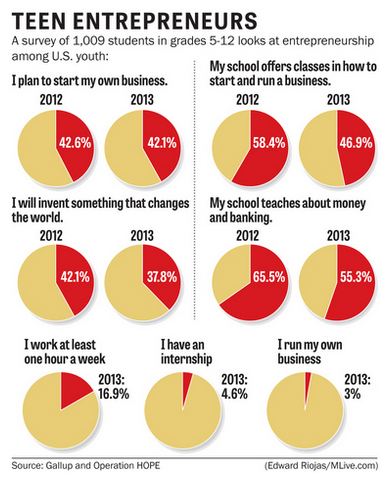Josh Seides
More posts from Josh Seides
Facebook, Google, Yahoo — the pillars of the social revolution were all started by college students in their dorms. This was 10, 20 years ago. In the past decade, the proliferation of youth-centric startups prevails — and even flourishes. A constantly increasing 54 percent of millennials desire to start a business, according to the Kauffman Foundation, and the number of new business owners under 34 increases by more than 300,000 each month.
The last six months has witnessed the blossoming of dozens of multi-million dollar startups from college students — some remaining in school and some delaying — including Snapchat’s rise to 400 million snaps per day with a $19 billion valuation and Dropbox’s now $257 million in funding and 400 million users.
These trends have translated into backlash against the “restraints” posed by demanding schoolwork and college life, leading to programs like the Thiel Fellowship and Breakout Labs scorning the broken education system and developing well-funded college dropouts. Jonathan Cain, President of Thiel Foundation, claims only 7 percent of fellows (of 80) have returned to college, while the rest have generated more than $100 million in economic activity. But is it really worth it? Are schools actually toxic death spells for hopeful entrepreneurs?
The Paradox Of Tech And Entrepreneurship Education
It seems fitting to first look into where all these college CEOs come from — elementary through high school. From 2012 to 2013, a survey indicated schools offering entrepreneurial classes dropped from 58.4 percent to 46.9 percent. Even more foundational, classes on money dropped from 65.5 percent to 55.3 percent in just a single year.
Fewer and fewer youth are exposed to the core of business and lose track from the start. In a survey of 40 entrepreneurial education leaders in different states, 90 percent claimed colleges offer entrepreneurship education, while only 24.3 percent responded that teachers in high school are expected to include entrepreneurship in the curriculum.
This can be traced to the lack of computer science — the core of modern entrepreneurship — in schools. Only 5 percent of U.S. high schools offer AP computer science, and only 27 states actually allow computer science to count toward high school graduation. Not only does this inherently strain entrepreneurship, but this bars most students from forming an interest in keeping up with trends and problems in the tech world — crucial for any modern startup, especially youth-centric.
How can schools bring in entrepreneurship if they can’t even teach computer science? These two are complements, and without either one the entrepreneurial development of students is gravely hindered. But schools aren’t picking up on this. It isn’t until college when a majority of students have the opportunity to learn computer science, stay up to date with trends and start experimenting with business.

What K-12 Schools Can Do: A Look Into Ultra-Successful College Startups
iCracked started when AJ Forsythe found his cracked iPhone screen frustrating. At the time, he was still a student at Cal Poly. With revenues north of $25.2 million, 2,400 iTech repairers worldwide and +25 percent revenue growth each month, the startup has become a giant in iOS repair (to Apple’s dismay), fixing iPhones, iPads and iPods at consumers’ desired locations for flat prices.
The school social environment actually seemed to help Forsythe. He used his fraternity to acquire initial customers, found his first $10,000 investment from a peer and brought on a crucial lead designer from among his classmates to spark the business. With classes on computer science and business that sparked his interest, Forsythe was able to capitalize on Cal Poly’s social atmosphere and its entrepreneurial exposure. Now his work nets the company more than $1 million a month.
HourlyNerd began as a class project in Harvard Business School’s Field III course. Devising a way to pair MBA students with small businesses for hourly consulting, the “project” quickly grew into a company with more than 10,000 independent consultants and more than $12.5 million in funding, notably $450K from Shark Tank’s Mark Cuban and a $7.8 million Series B funding from five investors last February.
With customers including Microsoft, GE and Coca-Cola already, HourlyNerd is growing fast. Without the exposure for business case studying and similarly minded peers in HBS, co-founder Rob Biederman and others would not have the connections or expertise to scale. With more than 4,000 MBAs from 15 top business schools, HourlyNerd actually benefitted from college education and continuing on to graduation.
FlightCar started as a written-off idea by incoming college freshman Rujul Zaparde. He was set to attend Harvard in the fall of 2012. Creating a platform for travelers to rent their cars and earn money in the process, FlightCar has more than 160 employees serving more than 90,000 members. The company raised $22 million in venture capital and continues to experience +20 percent monthly growth rate in membership.
While two of the co-founders dropped out of Ivy League schools and another from MIT, they all saw college as the “back-up plan” — a fallback in case the business didn’t work out. While seemingly the classic case of a successful college dropout startup, FlightCar exhibits the very power of college education: some use it, stay in college and build a social following for their business, while others simply take what they’ve learned or the sheer comfort of knowing college is a fallback option and scale rapidly.
Either way, none of these three very successful and lucrative businesses would be where they are now without the education, social network and startup exposure colleges naturally offer.
Indeed, K-12 schools have much learning to do.
An earlier version of this article incorrectly stated the current number of Dropbox users.































Comment